
views
Islamabad: For years, Pakistan did not put prisoners to death. Then a Taliban attack butchered 150 people, most of them children, and the country resumed carrying out the death penalty and quickly turned into one of the world's most avid executioners.
But instead of killing terrorists, the campaign is largely executing common criminals, The Associated Press has found.
Only one in 10 of the 226 prisoners executed since December was convicted of a terror attack, according to human rights activists.
Still, the executions continue in order to placate a public still angry over last year's Taliban assault on a military school in the city of Peshawar.
The Pakistani government refuses to discuss the executions, and most on the street still support them. Some, however, are beginning to question whether the death penalty truly works as a deterrent in a country where suicide bombings remain a common militant tactic.
"You cannot deter those terrorists who are committed to die for a cause," said analyst Hasan Askari Rizvi, a retired political science professor.
Pakistan under former President Pervez Musharraf halted executions in 2008, partly due to the pressure of human rights groups.
The hiatus started after another terror attack shocked the nation the assassination of former Prime Minister Benazir Bhutto amid a heated election campaign.
The government blamed the Pakistani Taliban for that attack as well, though the terrorists never claimed responsibility for the assault and others questioned why elements of Pakistan's powerful intelligence agencies failed
to prevent her killing.
At the time of the pause in 2008, Human Rights Watch said some 7,000 people were on Pakistan's death row and 36 had been put to death that year.
The year before, authorities executed 134 people; they put to death 85 in 2006, 52 in 2005 and 21 in 2004. Officials discussed commuting the death sentences of those remaining to life in prison, but apparently never did.
After 2008, Pakistan's military executed only one soldier in 2012 after convicting him of murder.
Civilian authorities largely didn't discuss resuming executions, even as the Pakistani Taliban and other insurgent groups continued their campaign of violence across the country, including suicide bombings and the 2012 shooting of future Nobel Prize laureate Malala Yousafsai.



















Comments
0 comment